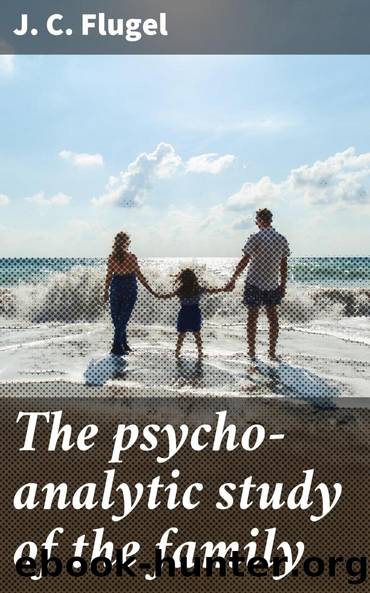The psycho-analytic study of the family by J. C. (John Carl) Flugel

Author:J. C. (John Carl) Flugel [Flugel, J. C.]
Language: eng
Format: epub
Google: t3LQAAAAMAAJ
Publisher: International psycho-analytical Press
Published: 1921-01-15T05:13:27+00:00
* * *
CHAPTER XIV
THE ATTITUDE OF PARENTS TO CHILDREN
In dealing thus far with the psychic aspects of the filio-parental The affective reactions of the parent towards the child relations in their origin, nature and development, we have for the most part based our considerations on the standpoint of the child rather than on that of the parent. Such a course would seem to be justified from the genetic point of view by the fact that every individual has first to be a child before he can become a parent, and that consequently, though his attitude as a parent is very liable to be influenced by his experience as a child, there can be no corresponding influence of a converse nature. As a matter of fact, however, we have, in the course of our consideration of the psychic development of the child in relation to the influences emanating from the family, fairly often had occasion to concern ourselves at least indirectly with the mental attitude of the parents as a factor in this development.
Thus we have seen that the direction of the child's affection to the parent of the opposite sex rather than to the one of his own sex is probably determined largely by the extent of the affection which the child in his turn receives from the two parents respectively; the heterosexual inclinations of the parents causing them on the whole, and in the absence of any powerful factors tending to produce an opposite result, to give their love most freely towards those of their children who are of the opposite sex to their own. We have seen too that the nature and duration of the feelings of envy, jealousy and hate which a child is liable to experience towards one or other of its parents are to a very considerable extent dependent on the behaviour of this parent towards the child. It is evident also from our previous considerations that there is likely to be a quantitative as well as a qualitative correspondence between the love and hate which a child may feel towards its parents and the manifestation of corresponding emotions in the parents themselves. All that is left for us to do in this direction is to look a little more closely into some of the factors which determine the nature and extent of the affective reactions of the parent towards the child.
It is now pretty generally agreed among psychologists The instinctive love of parents to children that the love of parents to their children takes place in virtue of the formation of a sentiment[200] or organisation of instinctive dispositions about an idea (in this case the idea of the child), and it is further usually supposed that in this sentiment a leading part is played by a particular instinctive dispositionâa disposition which manifests itself in consciousness in an emotion of more or less specific quality, to which McDougall, following Ribot, has given the now familiar term "tender emotion." Now there are clear indications that the
Download
This site does not store any files on its server. We only index and link to content provided by other sites. Please contact the content providers to delete copyright contents if any and email us, we'll remove relevant links or contents immediately.
Complete Works of John Buchan by John Buchan(373)
A FIGHTING MAN OF MARS by Edgar Rice Burroughs(365)
Prisoners of War in Britain 1756 to 1815 by Francis Abell(332)
Arsene Lupin vs. Herlock Sholmes by Maurice Leblanc(311)
Ireland In The New Century by Plunkett Horace Curzon Sir(294)
Hotwife Rescued--A Wife Sharing Multiple Partner Wife Watching Hotwife Romance Novel by Karly Violet(279)
Lord Palmerston by Anthony Trollope(272)
The Amateur Diplomat by Hugh S. Eayrs & Thomas B. Costain(267)
The Frontiers of Language and Nationality in Europe by Leon Dominian(265)
Boris Karloffâs Favorite Horror Stories by Boris Karloff(255)
BY Anthony Trollope - The life of cicero . vol. 1 by 1881(250)
Scraps by Jane Austen(249)
The Life of Jesus Critically Examined by Dr. David Friedrich Strauss by George Eliot--Delphi Classics (Illustrated) by George Eliot(227)
Delphi Works of Sir Arthur Conan Doyle (Illustrated) by Sir Arthur Conan Doyle(226)
Mr. Surprise Daddy: An Accidental Pregnancy Romance (Love, Accidentally) by Annabelle Love(205)
Siegfried and The Twilight of the Gods: The Ring of the Niblung II by Wagner Richard;(202)
The Thousand and One Days by Miss (Julia) Pardoe(177)
A Journey through Persia, Armenia, and Asia Minor, to Constantinople, in the Years 1808 and 1809 by James Justinian Morier(171)
The First Book of Farming by C. L. (Charles Landon) Goodrich(169)
